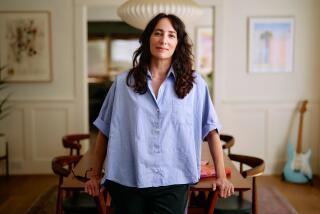South Africa’s 1st Legal Mixed-Race Couple Allowed to Marry, Not to Live Together
- Share via
MARIANNHILL, South Africa — A year after becoming South Africa’s first couple to marry legally across racial lines, Protas Madlala and his white American wife are living apart and thinking about leaving the country.
While whites and nonwhites can marry, the rules of apartheid still dictate where they live and work.
For the former Suzanne Leclerc of Cumberland, R.I., and her husband Protas it means they either live together in a squalid black township or live apart.
Unable to get permission to work in South Africa, SuzanneMadlala has taken a job in Transkei, a nominally independent black homeland in South Africa, 235 miles from her husband.
Monthly Reunions
He lives here in Mariannhill, a church-run settlement near Durban, where he has a job as a community worker.
Tired of being gawked at by curious blacks and sometimes hostile whites, Madlala and his wife avoid shopping or eating out together during their reunions once a month.
“Some problems are tied up with people’s identity--things that don’t change just by changing the law,” said Suzanne Madlala, 30, an anthropology graduate from George Washington University in Washington. “South Africa is just not geared to mixed marriages.”
She met Protas Madlala, also 30, in Washington in 1984 while he was studying there at American University for a master’s degree in communications.
Lives in Black Settlement
He lives alone in his tin-roof, three-room home. It has no running water or electricity and is surrounded by shanties, broken cars and squawking chickens in a dusty, run-down black settlement.
“If we can’t get decent accommodation where we can be together, then we will go,” he said. “I cannot sacrifice my wife to this. And it is not just the facilities. Culturally, she is isolated here.”
About 450 couples have married across racial lines since the white-minority government lifted a 36-year ban on mixed marriages last June 14, as part of its piecemeal reforms of apartheid.
A white who marries across the color line takes on the legal status of the darker spouse. That means living in an area segregated for blacks, Indians or people of mixed race who are known as “coloreds.”
A Mixed Blessing
The reform move has turned out to be a mixed blessing in a land where residential areas, state schools and some public transport remain segregated.
Although a couple of different colors dining together do not turn too many heads in a five-star hotel, they become a conversation stopper in more recently desegregated cafes or suburban restaurants.
Hostility and the myriad laws have driven out some of those mixed-race couples for whom emigration is an option because, like the Madlalas, one partner is a foreigner.
Jack Salter, 54, a Briton who settled in South Africa 22 years ago, left in April with his 23-year-old colored wife, succumbing to abuse from whites and after his grocery store was shut down.
License Taken Away
The white local authority in Kirkwood, a suburb of the Eastern Cape city of Port Elizabeth, withdrew Salter’s trading license on ground that he had effectively become a colored. Salter regained the license in a Supreme Court suit, but declared he had had enough.
The far-right Reformed National Party has said the lifting of bans on marriage and interracial sex symbolized “the immense threat to the continued existence of white society.”
It used pictures of the Madlala wedding and spotlighted other couples in a successful parliamentary by-election campaign against President Pieter W. Botha’s governing National Party last year in Sasolburg.
In a telephone interview from Umtata, the Transkei capital, Suzanne Madlala said her determination to marry in South Africa last June 15 was a statement against apartheid, whether the law was changed or not.
Problems Mounted
It was changed the night before the wedding, and then the problems mounted. Suzanne Madlala was finally given a residence permit only this last April, but not a work permit.
For six months she lived in Mariannhill with her husband, unable to take a bus to Durban with her husband because public transport from Mariannhill is blacks-only.
There are no better living accommodations nearby for blacks, such as Madlala, who can afford them. Mariannhill is particularly run-down because the government at one time had hoped to force its residents to move to a tribal homeland. That plan was recently dropped.
“I had all sorts of stomach ailments . . . and something like typhoid,” she said of her life in Mariannhill.
‘Where Are We Going to Live?’
“It is not only the lack of a work permit that keeps me in the Transkei, but also where are we going to live? We can’t live in a white area and a black township is not an appropriate place to be living in at all.” In Umtata, Suzanne Madlala is a university teacher.
Protas Madlala was more forthright. He said his yearning for privacy was exacerbated by disapproval of black neighbors because he helps with housework instead of leaving it to his wife, in accordance with African tradition.
“The people were very happy for her to be here . . . but there is no privacy,” he said. “They are around all the time. I just can’t stand it--even more than whites staring. There is no place left to hide.”
During a drive to his office past a white suburb, Madlala pointed out a small house where they would like to live.
“But then perhaps I’d start getting nasty phone calls from (black) radicals saying I was a sellout,” he said. “But if we could get somewhere to live I’d stay. We are very political and we believe the struggle is in South Africa--and we have skills to contribute.”
More to Read
Sign up for Essential California
The most important California stories and recommendations in your inbox every morning.
You may occasionally receive promotional content from the Los Angeles Times.













